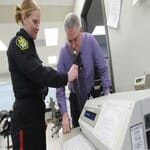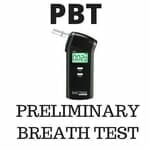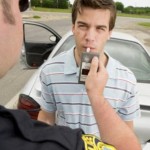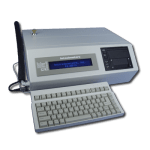Breath Testing Virginia DUI Law
 There are three types of breath alcohol tests in Virginia. The Preliminary Breath Test, the Intox EC/IR II, and Ignition Interlock. Breath alcohol tests do not directly measure your blood alcohol content of “BAC”. That requires a blood test. Instead, they estimate the blood alcohol content indirectly by measuring the amount of alcohol in your breath. A breath alcohol test measures how much alcohol is in the air you breathe out. The device uses that measurement to estimate how much alcohol is in your blood.
There are three types of breath alcohol tests in Virginia. The Preliminary Breath Test, the Intox EC/IR II, and Ignition Interlock. Breath alcohol tests do not directly measure your blood alcohol content of “BAC”. That requires a blood test. Instead, they estimate the blood alcohol content indirectly by measuring the amount of alcohol in your breath. A breath alcohol test measures how much alcohol is in the air you breathe out. The device uses that measurement to estimate how much alcohol is in your blood.
Preliminary Breath Test (“PBT”)
 There is no requirement to submit to a roadside preliminary breath test (“PBT”). The classic example involves a police officer pulling over a motorist for a traffic offense such as speeding where the police officer then claims to smell an odor of an alcoholic beverage on the driver’s breath. The police officer will likely transition the traffic stop into a DUI investigation. This is just one example of how a police officer may encounter a motorist and begin to build a DUI case.
There is no requirement to submit to a roadside preliminary breath test (“PBT”). The classic example involves a police officer pulling over a motorist for a traffic offense such as speeding where the police officer then claims to smell an odor of an alcoholic beverage on the driver’s breath. The police officer will likely transition the traffic stop into a DUI investigation. This is just one example of how a police officer may encounter a motorist and begin to build a DUI case.
Providing a “PBT” Breath Sample is VOLUNTARY

The roadside PBT is an important part of the investigating police officer’s DUI investigation. Virginia law says that any motorist suspected of DUI may be “asked” by the police to submit to a PBT to determine if there is probable cause evidence for a DUI arrest, but the motorist can refuse to submit to preliminary breath testing and such refusal cannot be used by the prosecution at trial for DUI. See Va. Code § 18.2-267 for a more detailed explanation of the PBT law.
Intox EC/IR II Breath Test Machine
 Virginia law enforcement officers use the Intox EC/IR II breath test machine to gather evidence for a DUI trial. If the police have probable cause evidence to make a DUI arrest for operating on a highway, then in most cases-the motorist will be directed to submit to a breath test at the police station. The breath sample is blown into a tube on the Intox EC/IR II breath test machine. The breath test machine then analyzes the breath sample provided by the motorist to calculate a blood alcohol content (BAC).
Virginia law enforcement officers use the Intox EC/IR II breath test machine to gather evidence for a DUI trial. If the police have probable cause evidence to make a DUI arrest for operating on a highway, then in most cases-the motorist will be directed to submit to a breath test at the police station. The breath sample is blown into a tube on the Intox EC/IR II breath test machine. The breath test machine then analyzes the breath sample provided by the motorist to calculate a blood alcohol content (BAC).
Refusal to Provide a Breath Sample at the Police Station
 The motorist can refuse to provide a breath sample. Unreasonable refusal to provide a breath sample for testing at the station will result in being charged with refusing a breath test. Many motorists refuse the breath test because they either do not want to provide the prosecution with additional evidence of intoxication or do not want to subject themselves to mandatory minimum jail penalties. See Va. Code §§ 18.2-268.2 and 18.2-268.2
The motorist can refuse to provide a breath sample. Unreasonable refusal to provide a breath sample for testing at the station will result in being charged with refusing a breath test. Many motorists refuse the breath test because they either do not want to provide the prosecution with additional evidence of intoxication or do not want to subject themselves to mandatory minimum jail penalties. See Va. Code §§ 18.2-268.2 and 18.2-268.2
Specially Trained DUI Defense Attorneys
 Our attorneys specialize in Virginia DUI law. We believe that clients are best represented by lawyers who possess a certain expertise. Our lawyers possess over 45 years of collective DUI DEFENSE experience. We are members of the National College for DUI Defense (NCDD). The NCDD is the country’s premier organization that trains DUI defense attorneys. Specialized training on defending DUI cases is essential for any lawyer who defends Virginia case.
Our attorneys specialize in Virginia DUI law. We believe that clients are best represented by lawyers who possess a certain expertise. Our lawyers possess over 45 years of collective DUI DEFENSE experience. We are members of the National College for DUI Defense (NCDD). The NCDD is the country’s premier organization that trains DUI defense attorneys. Specialized training on defending DUI cases is essential for any lawyer who defends Virginia case.
Virginia DUI Cases Involve Scientific Evidence
 The Intox EC/IR II breath test machine used by the police is nothing more than a fancy computer, and we all know computers can malfunction. Scientific evidence is often the best evidence for prosecution in a DUI case. This is why prosecuting attorneys and police officers rely more and more on breathalyzer tests in their efforts to establish guilt in drunk driving cases, but it is not technically required to prove intoxication beyond a reasonable doubt.
The Intox EC/IR II breath test machine used by the police is nothing more than a fancy computer, and we all know computers can malfunction. Scientific evidence is often the best evidence for prosecution in a DUI case. This is why prosecuting attorneys and police officers rely more and more on breathalyzer tests in their efforts to establish guilt in drunk driving cases, but it is not technically required to prove intoxication beyond a reasonable doubt.
Virginia Breath Test Defenses
 Our Virginia DUI Attorneys have extensive experience defending cases involving breath test evidence and will research and analyze your breath test results in an attempt to develop the best defense. Hiring an attorney who knows how to challenge the breath test in court is important. NOTE: You are not automatically guilty of DUI just because your breath test result was equal to or over the legal limit of a 0.08% BAC. There are many factors to analyze. Sometimes the breath test is inadmissible evidence.
Our Virginia DUI Attorneys have extensive experience defending cases involving breath test evidence and will research and analyze your breath test results in an attempt to develop the best defense. Hiring an attorney who knows how to challenge the breath test in court is important. NOTE: You are not automatically guilty of DUI just because your breath test result was equal to or over the legal limit of a 0.08% BAC. There are many factors to analyze. Sometimes the breath test is inadmissible evidence.
Alcohol Ignition Interlock Device
 The Alcohol-Ignition Interlock Device is essentially a Breathalyzer linked to a vehicle’s ignition system. Ignition Interlock Devices are installed in the defendant’s vehicle in most cases when there has been a DUI conviction. Most Ignition Interlock Devices now come installed with cameras. The driver must blow into the ignition interlock device in order to start the vehicle. Random breath tests are also performed while the vehicle is in operation.
The Alcohol-Ignition Interlock Device is essentially a Breathalyzer linked to a vehicle’s ignition system. Ignition Interlock Devices are installed in the defendant’s vehicle in most cases when there has been a DUI conviction. Most Ignition Interlock Devices now come installed with cameras. The driver must blow into the ignition interlock device in order to start the vehicle. Random breath tests are also performed while the vehicle is in operation.
Alcohol Ignition Interlock Violations
![]() Ignition interlock violations include starting a vehicle if the driver’s BAC exceeds 0.02% or if there is a similarly positive result during a rolling retest. The ignition interlock device keeps a record or log of the activity, which the authorities download at regular intervals. Detected violations, which include tampering with the device, are reported to the Court. Penalties include incarceration, restarting ASAP, and restarting driving with an ignition interlock. Ignition interlock Systems are installed at the driver’s expense.
Ignition interlock violations include starting a vehicle if the driver’s BAC exceeds 0.02% or if there is a similarly positive result during a rolling retest. The ignition interlock device keeps a record or log of the activity, which the authorities download at regular intervals. Detected violations, which include tampering with the device, are reported to the Court. Penalties include incarceration, restarting ASAP, and restarting driving with an ignition interlock. Ignition interlock Systems are installed at the driver’s expense.
Let us review the breath test results of your case. We can help!
11/10/2015 | Updated 9/9/2019
